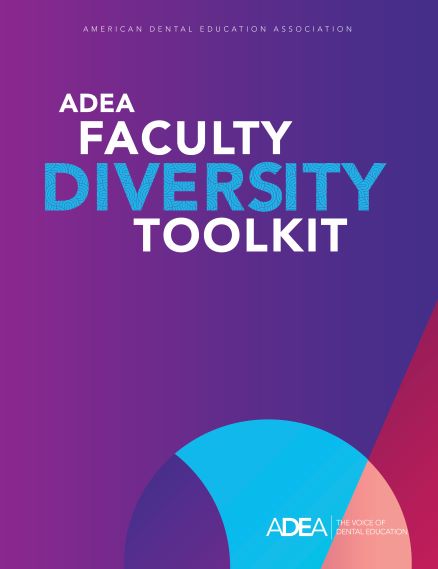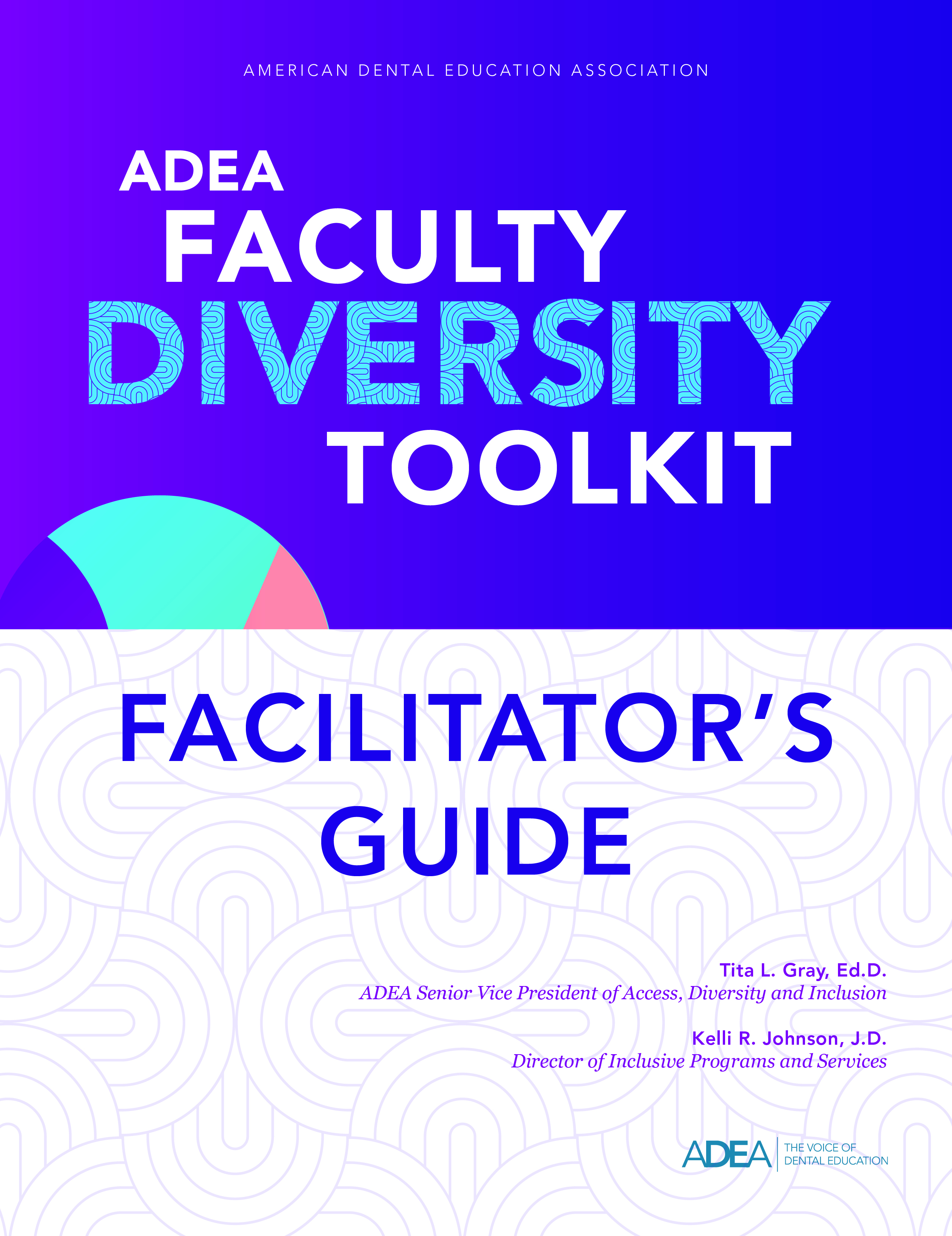
Faculty Diversity Toolkit
- Strategic Framework 1-1
- Diversity Checklist
- HURE Report
- Climate Study
-
Faculty Diversity Toolkit
- Chapter 1: Introduction
- Chapter 2: Barriers and Challenges to Recruiting and Retaining Diverse Faculty
- Chapter 3: Best Practice Highlights—Recruiting and Hiring Diverse Faculty
- Chapter 4: Best Practice Highlights—Retaining Diverse Faculty
- Chapter 5: Conclusion
- Appendix B: Diversity and Inclusion Terminology
ADEA Faculty Diversity Toolkit

The ADEA Faculty Diversity Toolkit provides an overview of best practices, strategies and model programs that postsecondary institutions have used to improve the recruitment and retention of historically underrepresented and marginalized faculty.
The Toolkit is also meant to assist dental schools and allied programs in evaluating and designing programs to improve their faculty diversity recruitment and retention efforts.
Download Adea Faculty Diversity Toolkit (PDF)
Authors: Sonya G. Smith, Ed.D., J.D., ADEA Chief Diversity Officer; Angelo Lee, M.Ed., ADEA Senior Director for Access, Diversity and Inclusion; and Jonathan Max Gilbert, Ph.D., Contributing Editor/Writer. With project support from the ADEA Faculty Diversity Toolkit Development Work groups.
Tips on using the online toolkit:
Use the links to navigate to topics of interest and/or download the ADEA Faculty Diversity Toolkit PDF.
Chapter 1: Introduction
- Defining Underrepresented and Historically Underrepresented and Marginalized Faculty
- Why Does Faculty Diversity Matter?
- Accreditation and Faculty Diversity
- Faculty Diversity Toolkit Purpose
- Faculty Diversity Toolkit Development
- Endnotes
Chapter 2: Barriers and Challenges to Recruiting and Retaining Diverse Faculty
- The Faculty Pipeline Challenge
- Chilly Climate, Biases and Myths
- Search Committees and Hiring
- Promotion, Tenure and Professional Development
- Endnotes
Chapter 3: Best Practice Highlights—Recruiting and Hiring Diverse Faculty
- Best Practice—Developing a Diverse Faculty Pipeline
- Best Practice—Faculty Searches
- Best Practice—Recruitment and Developing a Diverse Candidate Pool
- Best Practice—Preparing for an Equitable Search Process
- Best Practice—Evaluating Candidates
- Best Practice—Interviews, Campus Visits and Hiring Incentives
- Best Practice—Post-search Assessment
- Endnotes
Chapter 4: Best Practice Highlights – Retaining Diverse Faculty
- Best Practice—Mentoring and Professional Development
- Best Practice—Promotion and Tenure
- Best Practice—Inclusive Climate
- Endnotes
Chapter 5: Conclusion
The ADEA Faculty Diversity Toolkit (ADEA FDT) would not be possible without the assistance and feedback of the ADEA Faculty Diversity Toolkit Development Workgroup. We would like to thank this Workgroup, which consisted of diversity officers, ADEA Councils, ADEA Committees, faculty, staff, students and senior administrators representing the U.S. and Canadian dental schools and allied dental programs. (See Appendix A for a listing of representatives.)
In preparing this guide, the authors and Workgroup drew from extensive literature and research related to the recruitment and retention of historically underrepresented and marginalized faculty in higher education and the health professions. We also drew from the practical wisdom and conversations with many of our ADEA colleagues and elsewhere. A Case for Dental Academic/Community Partnerships for Leadership and Diversity: Toolkits Volume I and II were important foundational documents for us. They were developed by ADEA under the leadership of Jeanne C. Sinkford, D.D.S., Ph.D., FACD, FICO, the first woman dean of a U.S. dental school and ADEA Senior Scholar-in-Residence Emeritus, with support from the W.K. Kellogg Foundation. Another foundational document (unpublished) for the ADEA FDT, A Search Committee Toolkit: Best Practices and Strategies for Recruiting and Retaining Diverse Faculty and Staff, was developed by Sonya G. Smith, Ed.D., J.D., ADEA Chief Diversity Officer, during her tenure at the University of Tennessee Health Science Center.
Many people also contributed to the development of the ADEA FDT. ADEA would like to thank Ian Zaman, ADEA Senior Program Manager, who handled many of the tedious logistics of this project. Additionally, a special thanks to Rebecca Stolberg, RDH, M.S.D.H., ADEA Senior Director of Allied Dental Education and Faculty Development, for sharing her insights regarding allied dental faculty. We would also like to thank the ADEA Department of Communications and Membership for their ideas, creativity and editing expertise.
Disclaimer: This is Not Intended as Legal Advice. The purpose of this document is to provide general information. Federal and state laws may change at any time. If there is a question about the validity of any information presented or how it applies to your dental school or allied dental program, please discuss it with your institution’s legal counsel. Additionally, nothing in this publication is intended as legal advice and should not be construed as legal advice or a substitute for legal advice.
If you have questions regarding the ADEA Faculty Diversity Toolkit, contact the ADEA Access, Diversity and Inclusion staff at adi@adea.org or 202-948-4150.
Dear ADEA Community:
It is with great pleasure that I introduce the ADEA Faculty Diversity Toolkit (ADEA FDT). It is the result of the convening of the ADEA Faculty Diversity Toolkit Development Workgroup, a cross section of our members from U.S. and Canadian dental schools and allied dental programs (e.g. ADEA Advisory Committees, Councils, Sections, Diversity Officers and Women Liaison Officers). The ADEA FDT represents a seminal work in dental education and focuses on the challenges and best practices related to recruiting and supporting diverse faculty.
We all know the benefits of diversity and inclusion—research points to the positive impact that diverse faculty have on educational quality, the campus climate and educational outcomes. Evidence clearly shows that campuses with a critical mass of women, historically underrepresented racial/ethnic and marginalized groups in faculty and leadership positions are more likely to provide an environment in which students, staff, faculty, residents, fellows and administrators are more likely to:
- Challenge assumptions by breaking down gender stereotypes and racial biases;
- Enrich the climate by promoting greater willingness to address both national, global and community health care inequities;
- Increase socialization across racial and ethnic groups, faiths and socio-economic groups;
- Broaden their perspectives about racial, ethnic and cultural differences;
- Support inclusive research in non-traditional scholarship areas;
- Expand students’ understanding of the effects of language and culture on treatment and care of patients from different groups; and
- Engage diverse role models and mentors that support the entire campus community.i
We consider the ADEA FDT a critical resource designed to improve the recruitment and retention efforts of diverse faculty in dental education. Our hope is that the model programs highlighted throughout the Toolkit will stimulate further investigation
and piloting of programs by dental schools and allied dental programs in order to assess the transferability of these best practices and models to academic dentistry.
As new literature and innovative practices become available, we will supplement and evaluate the Toolkit’s content. Therefore, what follows is a living document— a “work in progress”—that we will expand and prune regularly.
Finally, the ADEA Strategic Directions 2019-22 stress the importance of developing and sustaining inclusive environments in which faculty, students, staff and administrators work together to create the future of dental education in an increasingly diverse and interconnected world. The development of the ADEA FDT is critical to our strategic direction. It not only assists dental education in recruiting and retaining a more diverse faculty, but also moves academic dentistry forward in its pursuit of inclusive excellence—the creation of intentional spaces that integrate diversity, equity and inclusion as the norm in the core aspects of our hiring, clinical and academic priorities as well as leadership, research, learning, decision-making, daily operations and organizational cultures.
I look forward to continuing our rich work together, in which a variety of talents, histories, perspectives and experiences form an energetic dental education community defined by inclusive academic excellence.
| Sincerely,
Karen P. West, D.M.D., M.P.H. ADEA CEO/President |
Endnote: i Antonio AL. Faculty of color reconsidered: Reassessing contributions to scholarship. J Higher Educ. 2002;73(5):582-602; Milem, JF, Chang, MJ, Antonio, AL. Making diversity work on campus: A research based perspective. Washington, DC: Association of American Colleges and Universities; 2005; Umbach PD. The contribution of faculty of color to undergraduate education. Res High Educ. May 1, 2006;47(3):317-345; and Milem JF. Increasing diversity benefits: how campus climate and teaching methods affect student outcomes. In: Orfield G. Diversity Challenged: Evidence on the Impact of Affirmative Action. Cambridge, MA: Harvard Education Publishing Group; 2001:233-249; Nelson Laird, TF. College students’ experiences with diversity and their effects on academic self-confidence, social agency, and disposition toward critical thinking. Res High Educ. 2005; 46:365-387; AAMC. Diversity and inclusion in Academic Medicine: A Strategic Planning Guide, 2nd Ed. Washington, DC: Association of American Medical Colleges, 2016.
Appendix A
ADEA Faculty Diversity Toolkit Development Workgroup
Appendix B
Diversity and Inclusion Terminology
Appendix C
Themes - Faculty Diversity Recruitment and Retention Barriers and Best Practices
Appendix D
Duke University School of Medicine Recruitment Toolkit
Provided courtesy of the Duke University School of Medicine. It was developed by the Duke University School of Medicine’s Inclusion Council, an inter-professional group of faculty, staff and learners representing the departments, institutes and centers within the School of Medicine.
Appendix E
Emory University Office of Equity and Inclusion Faculty Annual Recruitment Plan
Appendix G
ADEA MDFD Program Implementation Logic Model
Appendix H
Lessons Learned- ADEA/WKKF Minority Dental Faculty Development (MDFD) Program: “Growing Your Own”
Appendix I
ADEA Access, Diversity and Inclusion Framework 1-1
The ADEA Faculty Diversity Toolkit is dedicated to
Jeanne C. Sinkford, D.D.S., Ph.D., FACD, FICOProfessor and Dean Emeritus
Howard University College of Dentistry
ADEA Senior Scholar-in-Residence Emeritus
and
Leo E. Rouse, D.D.S., L.H.D. (Hon), FACD
Professor and Dean Emeritus
Howard University College of Dentistry
ADEA Senior Scholar-in-Residence Emeritus
2011-12 President of the ADEA Board of Directors
We are grateful for the example they have set for academic dentistry and their leadership in the advancement of diversity, equity and inclusion in dental education.
ADEA Faculty Diversity Toolkit Facilitator’s Guide
The ADEA Faculty Diversity Toolkit Facilitator’s Guide (Facilitator’s Guide) is a companion publication to the ADEA Faculty Diversity Toolkit (ADEA FDT).
Drawing on best practices and guidance from the ADEA FDT, the Facilitator’s Guide provides tools, methods and techniques to help groups understand and identify the challenges and barriers often associated with the recruitment and retention of diverse and marginalized faculty in dental education.
The Facilitator’s Guide also provides a template and information to help dental schools and allied dental education programs develop faculty recruitment and/or retention plans specific to their campuses.
DOWNLOAD FACILITATOR'S GUIDE PDF

